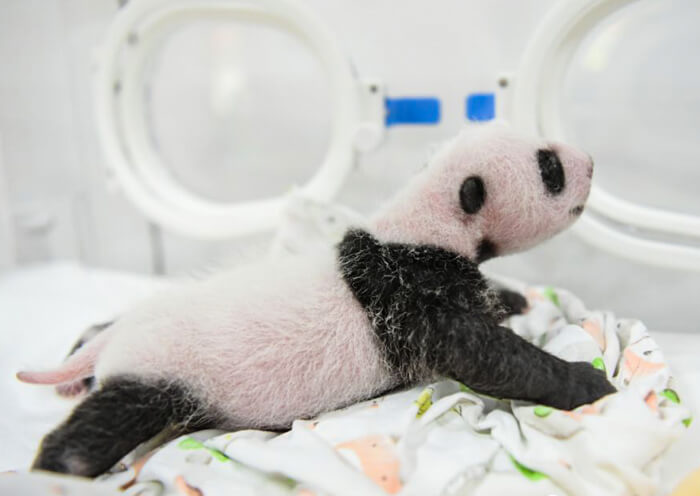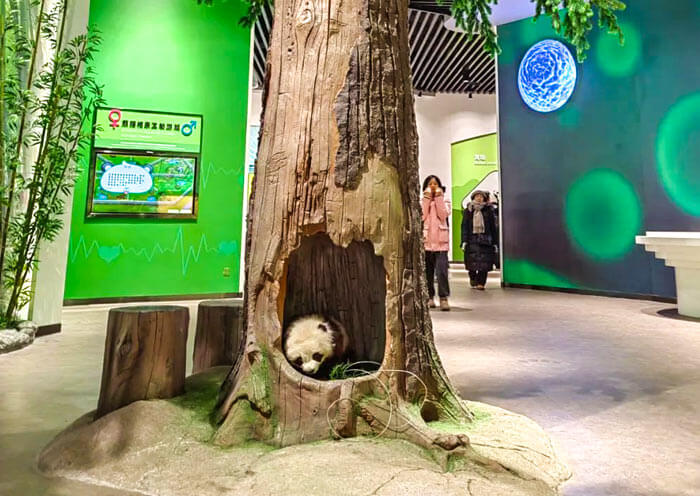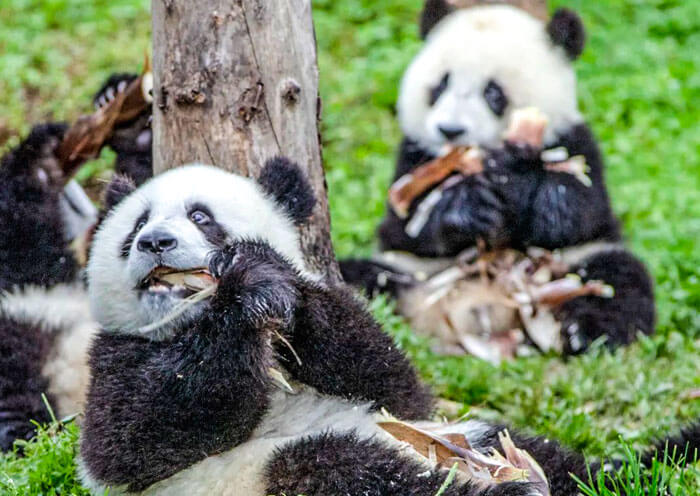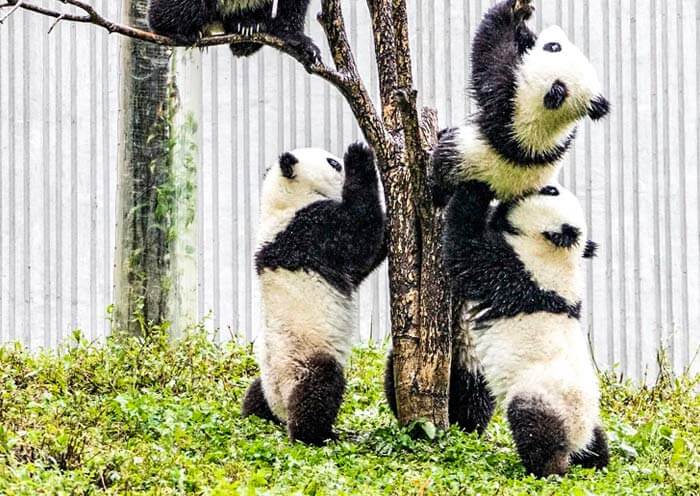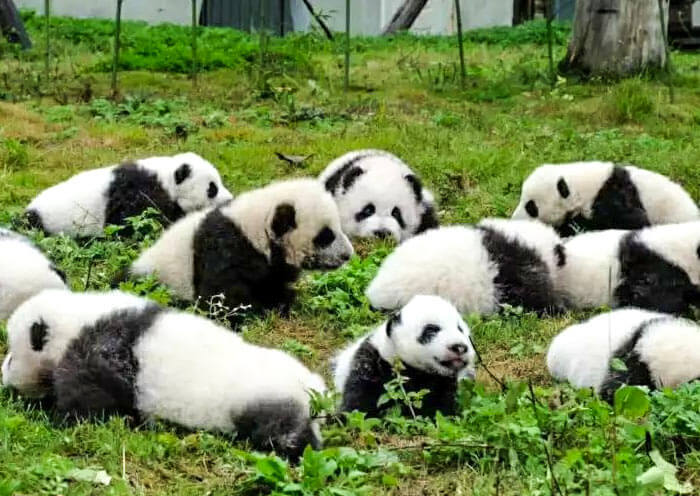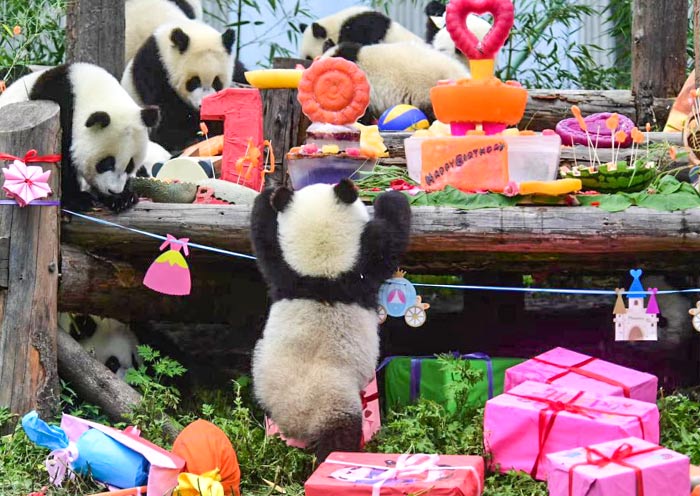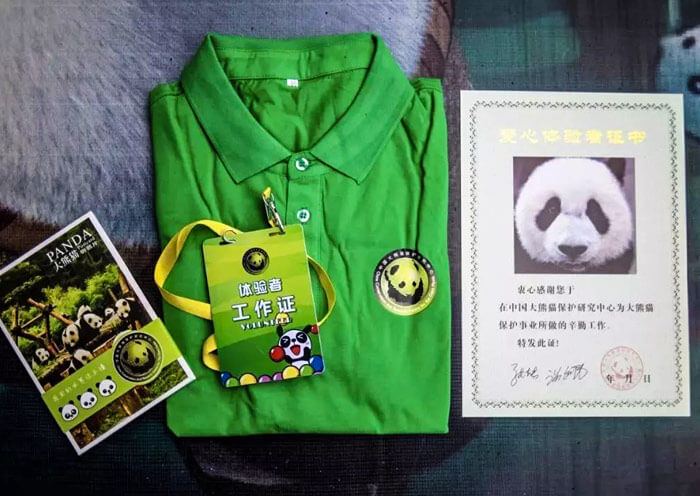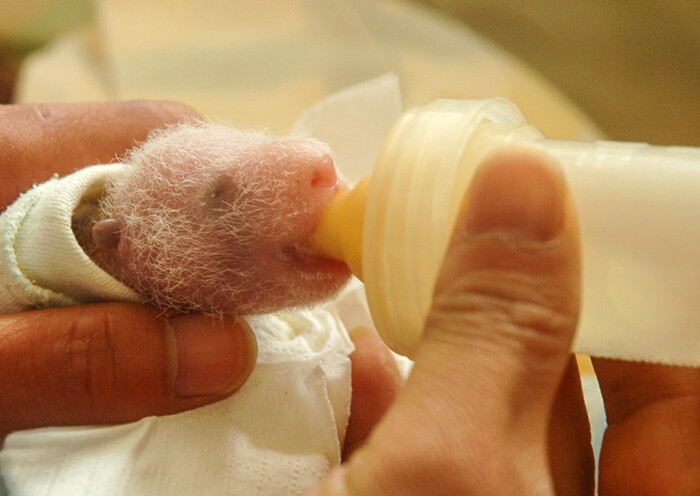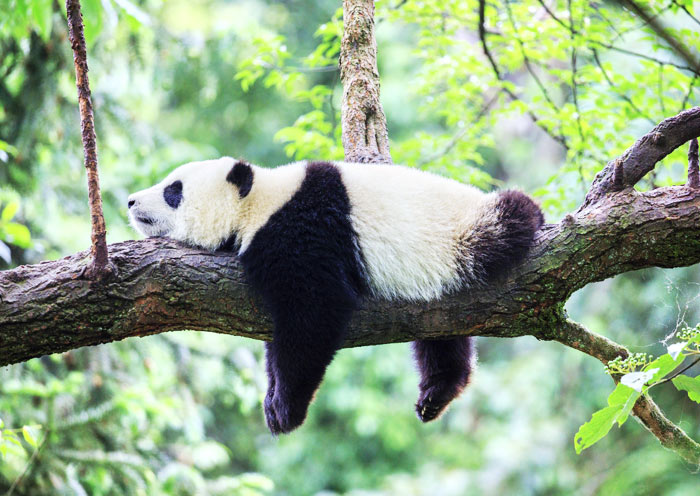In the morning, you will meet your guide at the appointed time in the lobby of your hotel. The Panda Volunteer Program starts at 8:30 am, so we will depart at about 7:30 for Wolong Panda Base. Located in Wolong Nature Reserve, this is a Panda Volunteer Base with fewer people, where you can fulfill your dream of being a panda keeper in the panda’s natural habitat.
The Wolong Panda Base is located in Gengda Town of the Wolong Nature Reserve. The base is at an altitude of 1,700 meters (wild giant pandas usually live in high mountain valleys between 1,400 and 3,600 meters above sea level), surrounded by green mountains, clear water, blue sky, and cool climate, which is the original habitat of giant pandas. The base is divided into three areas: the Shenshuping Giant Panda Breeding and Visiting Area, the Captive Giant Panda Wilderness Training Area, and the Wild Release Area. It is a world-class giant panda research center that integrates giant panda breeding, research, training, release, public education, and high-end scientific observation. Currently, the Giant Panda Breeding and Visiting Area is open to the public. It has 59 giant panda enclosures, which can accommodate 60-80 pandas and are divided into three parts: adult giant panda area, sub-adult giant panda area, and panda kindergarten.
The Wolong Panda Base is home to around 74 giant pandas, with more pandas than people. Not only can you capture photos of these lovely creatures from the best angles in each enclosure, but you can also enjoy the stunning natural scenery of Wolong. It is known as the best place in the world to observe giant pandas. Here, you can quietly watch pandas climb trees, roll around, eat, play, laze around, and fight. In the panda kindergarten, you can witness baby pandas and panda keepers engaging in intelligence games. You will see the baby pandas clutching onto the legs of their caretakers, just like children who want their parents to hold them.
In the winter, you can see pandas playing in the snow and rolling around like the real Bing Dun Dun, the official mascot of the 2022 Winter Olympics. Giant pandas have thick fur and are highly resistant to cold. Wolong is the original habitat of giant pandas, and it snows here every winter. The average annual temperature is 22℃, and the highest temperature in summer is 29℃. Wolong Panda Base is an ideal place to escape the summer heat and enjoy the snow. Don't forget to look for the star pandas, oversea returnee pandas, and their stories!
What does a Panda Volunteer do? Upon arrival at the Wolong Panda Base, you need to sign a safety agreement and receive a volunteer work card, clothes, and gloves. You will have the chance to watch panda keepers pick up panda feces, add fresh bamboo, and clean the panda enclosures. You will visit various panda enclosures, observe the behavior of the giant pandas, and learn about the stories behind different pandas. You will also have the opportunity to learn about panda cake recipes and make panda cake. After watching the panda nanny feeding and training the pandas, it will be time to feed yourself at the panda nanny's canteen. Finally, you will receive your Panda Volunteer Certificate, take a group photo, and return your work card.
To become a processional panda fan, here is a list of Panda Stars that live in Wolong Panda Base for your reference:
1.Tai Shan (oversea returnee panda) is a male panda born in 2005 at National Zoological Park. Tai Shan was the first giant panda to be born and survive in the United States National Zoo in Washington. His birth sparked a nationwide fascination with pandas, and the zoo held a naming contest for him. Over 200,000 people participated in the vote, and "Tai Shan" was ultimately chosen. Tai Shan is one of China's five sacred mountains, and the name was chosen to convey good wishes from both Chinese and foreign friends for Tai Shan's future. Tai Shan was supposed to return to China in July 2007, but due to strong requests from the US, China agreed to extend his stay for two more years. To celebrate this extension, April 24th was declared "Panda Day" in Washington. On January 30th, 2010, the American people bid farewell to Tai Shan in Washington's National Zoo amidst snow and wind. Every year, many friends and fans from all over the world come to visit him, making Tai Shan the most popular giant panda in the world.
2.Bao Bao, (oversea returnee panda) is a female panda born in 2013 at National Zoological Park. Bao Bao comes from a prestigious family, with parents Mei Xiang and Tian Tian, who are giant pandas living in the United States. Her brother Tai Shan is the world's most popular giant panda superstar, and her name was chosen through an online voting campaign sponsored by the National Zoo in Washington, D.C., the Chinese embassy in the United States, and the US embassy in China. The name "Bao Bao" means "precious" or "treasure" in English. On January 18, 2014, Bao Bao made her public debut and attracted crowds of visitors to the National Zoo, including local residents who don't normally visit the zoo and panda fans who drove for nine hours just to see her. As a popular star at the National Zoo, Bao Bao brought joy to countless American families. In February 2017, the National Zoo held a farewell event for Bao Bao, and she returned to her hometown in China on February 21, 2017 via the "FedEx Panda Express."
3.Hai Zi is a female panda born in 1994 and was rescued from the wild in Sichuan Province. Hai Zi set the record for the oldest age at which a giant panda gave birth and the oldest age at which a giant panda gave birth to twins. In the spring of 2019, she began exhibiting typical mating behaviors such as reduced appetite, playing in water, seeking shade, and seeking a mate. Given her good health, typical mating behavior, and high genetic value, the China Conservation and Research Center for the Giant Panda had the best breeding and medical technology, and there was a successful instance of a 22-year-old giant panda giving birth previously. Therefore, the center decided to arrange a mate for her at the appropriate time. On April 5, 2019, Hai Zi hit it off with You Bao and had a successful natural mating, despite their significant age difference. After a gestation period of nearly four months, Hai Zi successfully gave birth to twin panda cubs. Hai Zi is a gentle, loving, and patient mother who never gets angry at her cubs, no matter how much they bother her, and always plays with them patiently.
4. Qiao Qiao is a female panda born in 2009 and was rescued from the wild in Sichuan Province. Qiao Qiao is the second giant panda, after Cao Cao, to be successfully introduced and give birth in the wild as part of the reintroduction program launched in 2017. Her twin cubs are the world's first giant panda cubs to be born in the wild as part of a reintroduction program. Qiao Qiao's successful birth of twins through reintroduction once again demonstrates the professionalism and scientific nature of the technical strength of the China Conservation and Research Center for the Giant Panda, as well as the scientific validity and feasibility of giant panda reintroduction in the wild. The success of reintroduction can not only achieve blood exchange between captive and wild populations but also play a positive role in the revitalization of wild giant panda populations and the construction of giant panda national parks, thus promoting the development of giant panda conservation in China. At the same time, it provides new ideas and methods for the reintroduction and conservation of other rare and endangered large mammals, including giant pandas.
5.He He (male) and Mei Mei (female) are pandas born in 2018 at Wolong Hetaoping Base of China Conservation and Research Center for the Giant Panda. The twin siblings He He and Mei Mei, a boy-girl pair, are the world's first giant pandas born in the wild as part of a reintroduction program, and their mother is Cao Cao, the first giant panda successfully reintroduced into the wild. Their birth is another breakthrough success for captive giant panda reintroduction in the wild after the successful birth of a reintroduced giant panda in 2017 by the China Conservation and Research Center for the Giant Panda, which has attracted global attention. They have also been certified by the Guinness World Records as the first surviving twin pandas born through captive giant panda reintroduction in the wild. The China Conservation and Research Center for the Giant Panda named the panda cubs He He and Mei Mei after the panda characters in the domestic high-quality animated works "Panda and Mole" and "Animal Chorus," which imply harmony, beauty, coexistence, and endless vitality. The groundbreaking cooperation between the China Conservation and Research Center for the Giant Panda and CCTV Animation Co., Ltd. also aims to explore and attempt a new approach to public education and cultural communication related to giant pandas by creatively integrating virtual animated images and physical panda images.
6.Wen Wen (female) and Chuan Chuan (male) are pandas born in 2019 at Wolong Shenshuping Base of China Conservation and Research Center for the Giant Panda. Their names are derived from the name of Wenchuan County. It represents the gratitude of the people of Wenchuan for the help provided by the world during the reconstruction after the 2018 earthquake. Wen Wen and Chuan Chuan have taken on the important mission of developing the giant panda conservation work in Wenchuan. Wenchuan is the hometown of giant pandas. For thousands of years, the diligent and honest people of Wenchuan and the giant pandas have coexisted harmoniously in the Qionglai Mountains in the upper reaches of the Yangtze River. According to the Fourth National Giant Panda Survey, Wenchuan (Wolong) in Sichuan province has 165 wild giant pandas, ranking first in the world, with 148,000 hectares of wild giant panda habitat. The Wolong Nature Reserve is located in Wenchuan County, and Wenchuan also holds an annual "Panda Festival" for giant pandas. Now, Wen Wen and Chuan Chuan have become the "darlings" of Wenchuan that cannot be ignored.
7.Bing Bing is a female panda born in 2015 at Ya’an Bifengxia Panda Base. Bing Bing (meaning “Ice”) has a twin brother named Qing Qing (meaning “Indigo” in Chinese). The names "Bing Bing" and "Qing Qing" not only refer to the saying “Indigo is derived from blue but is more pleasing than blue; ice is formed out of the water but is colder than water”, but also allude to the legend of Li Bing (the same "Bing" as Bing Bing) building the Dujiangyan Irrigation System and guarding Qingcheng Mountain (the same "Qing" as Qing Qing). Qing Qing is a popular internet celebrity, known for his love of rolling in water ditches since he was a cub, earning him the nickname "Man Yue Mei"(蔓越莓Coal Ball) by netizens. Bing Bing also get a nickname as “Tang Tang”(碳碳 Coal). When talking about these two siblings, we cannot fail to mention their caretaker, Yang, who is affectionately referred to as "Dad Yang" by the pandas. Typically, as pandas grow up, they become less inclined to let caretakers get close to them. However, these two siblings always stick to Yang, allowing him to pet them and even exercise with him. Like his brother, Bing Bing, who is over 8 years old, has also reached reproductive age. Under the breeding plan of the China Conservation and Research Center for the Giant Panda, Bing Bing will make his own contribution to the development of the giant panda population.
Take your time to discover more about the panda stars and panda stories.
Kindly take note of the following:
1. Booking Note: The Panda Volunteer Program has a daily limit for participants. Contact us in advance to secure your spot.
2. Age Limit: Volunteers must be between 10 and 70 years old. We also offer other activities, such as watching documentary movies and making panda cakes.
3. Physical Examination Report is required for the Panda Volunteer Program Application. Please check the PDF for the form and contact us for any questions.
4. Dress Code: To prevent slipping, avoid wearing short pants or slippery footwear. Do not wear perfume or nail polish as pandas have a strong sense of smell. Thank you for respecting the pandas.
In the afternoon, head back to Chengdu.
Then, it is time to end your 2-day Wolong Panda Volunteer Tour - From Chengdu City to Panda Habitat. Your guide will escort you to your hotel or the airport/train station for your flight or high speed train to your next destination.
Thank you for choosing Asia Odyssey Travel for your Chengdu tour, and we are always here working for you and hope to see you again for your next trip around China/Asia.







